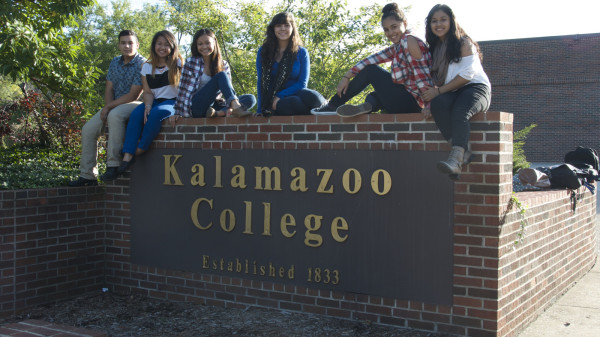Kalamazoo College joined the list of campuses where APTP has performed when 5 ensemble members helped open the college’s WITH/OUT Borders Conference. The performance also gave our APTPians the opportunity for a college visit.
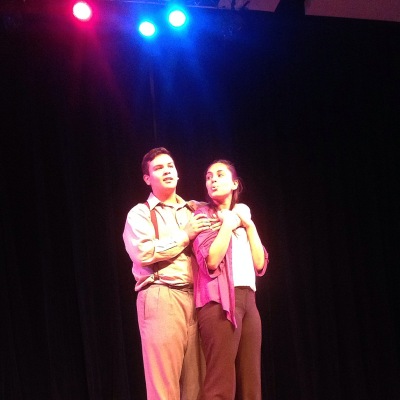
APTPians Kito Espino and Lizbeth Acevedo perform at Kalamazoo College.
APTP’s performance was presented by Kalamazoo College’s Arcus Center for Social Justice, which provides programs and activities that teach and promote social change practices that enable K students and others to imagine a socially just world, and be a part of creating it.
APTP alumna Stephany Perez, a Kalamazoo sophomore, introduced the company’s performance and hosted the younger APTPians.
The idea of APTP performing at K began nearly two years ago, the day Kalamazoo professor Lesley Tung met Stephany Perez when she visited as an admitted student. Stephany introduced Les to APTP, and he traveled to Chicago that summer to see Home/Land at the Goodman Theatre. Immediately, Les knew he wanted to bring APTP to perform at Kalamazoo and began working to make it happen. He wasn’t disappointed:
"Albany Park Theater Project's performance at Kalamazoo College was spellbinding, proving once again that when art is so professionally done, it connects us across geography, race, and class. APTP showed they were kindred spirits with Kalamazoo's commitment to social justice."
Professor, Kalamazoo College
One of the great joys of the night for all of us at APTP was being introduced by Stephany Perez, who arrived at APTP in 2008 at the end of 7th grade. After five years with APTP, during which Stephany created memorable characters in plays like Feast and Home/Land, Stephany is now a first-generation college student at Kalamazoo. Here is how she introduced her APTP community to her Kalamazoo community:
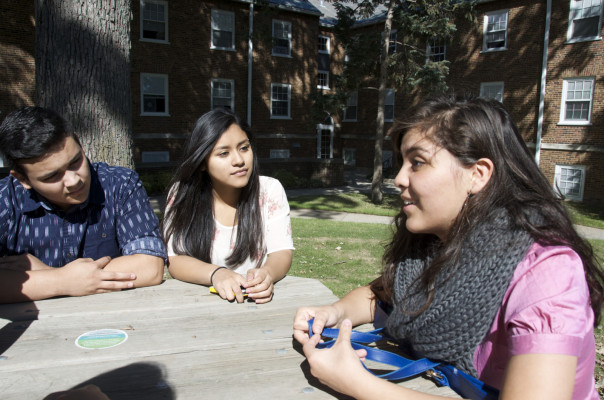
Stephany Perez (APTP '13, Kalamazoo College '17) talks to current APTPians about college, including Paloma Morales (APTP '15) and Kito Espino (APTP '17).
My name is Stephany Perez, I’m a sophomore here at Kalamazoo College and my intended major is… a surprise. I’m from Chicago, raised in Albany Park, one of the most diverse communities in the United States. I was a part of Albany Park Theater Project for five years; I did 4 productions with them. Albany Park Theater Project, or APTP for short, is a theater company of young adults that create plays based on stories we collect from immigrants and working-class Americans in the Chicago area.
Storytelling is the oldest form of communication, expression and connection that humans have. Through imagery, sound, gesture, and heart people can communicate just about anything and raise empathy, inspiration, energy, and feeling. It is through storytelling, that APTP works and it is through storytelling that we continue to participate and share each other’s struggles, fights, empowerment and triumphs. I have become more dedicated to being a good citizen for my fellow human beings because of the journeys I have taken through theater and stories. I take the time to listen, to interpret and to act upon issues that are important to me.
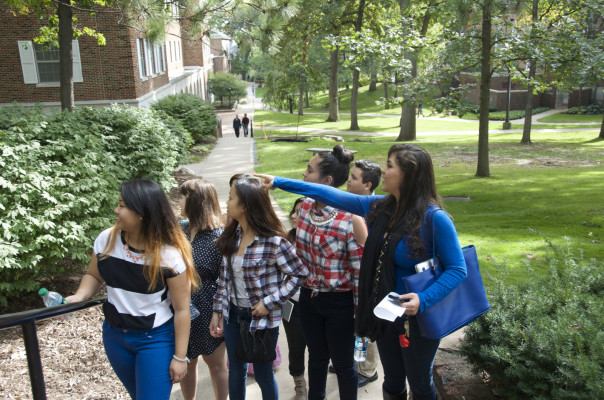
Tour Guide! Stephanie Perez shows current APTPians around the Kalamazoo College campus.
At APTP, I became more aware of the injustices that exist in our world. The first play I created with APTP was about a young immigrant girl who went through sexual abuse most of her life. That story came from an APTP ensemble member who was one of my friends. At the time I was just entering eighth grade, and this was the first time that I openly discussed such a taboo yet prevalent issue. We did research on who the victims of sexual abuse are and how infrequently it gets reported, especially in immigrant communities. We were surprised by how common it is for a relative rather than a stranger to be the offender. We shared with each other stories of people we knew who were sexually abused. We also explored other factors that shaped our storyteller’s life; besides sexual abuse, she faced immigration issues, family issues, poverty, drug use and psychological trauma. Out of these discussions and explorations we devised our play.
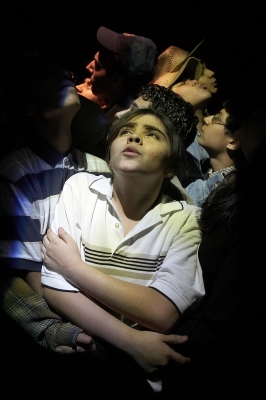
Stephany in her first production with APTP, "Remember Me Like This," in 2009.
I was chosen to create the lead role of the storyteller in the play. I didn’t want to just pretend on stage that I knew what she felt. To make my performance honest and personal, I needed to let people know how much having heard my friend’s story meant to me. I remember the rehearsal when I understood this was going to be hard. My director asked me to close my eyes and pretend that the two men who had raped my character were standing in front of me, but that I was safe and this was a time when I could say anything to them. For a long while I sat in silence, until I began to cry and to yell things that I did not know I had inside of me. I let myself enter an emotional and mental state that was past pretending to be a character, in which I felt closer to my friend and everyone else I knew who went through sexual abuse. In that moment, I felt pain that girls are being violated so young and so often and that these violent acts are not being prevented. It upset me to know that people I loved like family were being hurt. I could feel in the hot tears rolling down my cheeks all the love that I had for the world.
That’s when I began to realize that I needed to change the world, somehow, some way.
By the end of the play, we didn’t heal our storyteller’s wounds or end all abuse, but we did educate many people, including 3,000 audience members and the teens in our ensemble that were part of the play. The ultimate goal for our APTP plays is to inspire people to make a change in the world. With my work on this play, I recognized that art is a way to communicate a vision of the world. In my five years with APTP, I learned to craft and embrace my vision for the world, and I assumed an active role in changing the world. I created an original play about food and culture and another about immigrant rights. The plays I created and performed with APTP were seen by more than 10,000 people and praised by Chicago’s top theater critics. I participated in activism that stopped the Department of Homeland Security from building a new immigrant detention center. I also became an educator. I facilitated workshops for teens brand new to our company to develop my leadership skills as well as actively connect with my soon-to-be new ensemble members. I led workshops at national conferences on theater and education for theater teachers who could learn our APTP techniques and incorporate them into their schools and classrooms back home. Leading these workshops for educators from around the country was like changing the world without having to be in all the places ourselves.
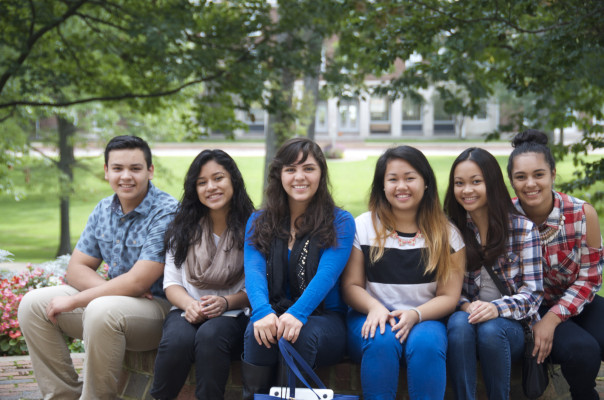
Stephany with her younger APTP guests at the end of their visit: Kito Espino, Paloma Reyes, Kiara Lyn Manriquez, Maidenwena Alba, and Lizbeth Acevedo.
Over my five years at APTP, I became a musician, a dancer, a writer, an educator, an ethnographer and an activist. Most importantly, I learned to ask unfiltered questions about issues that matter to me and my community: gender, race, poverty, citizenship, government, immigration, education and healthcare.
Communities like APTP are important in their roles as catalysts for social change, they are the first drops of water in the ripple effect. APTP has and continues to have a significant effect on who I am today. As a low-income woman of color, there aren’t many places I feel worthy or safe. At APTP I feel powerful and I feel inspired to empower others.
 Menu
Menu
